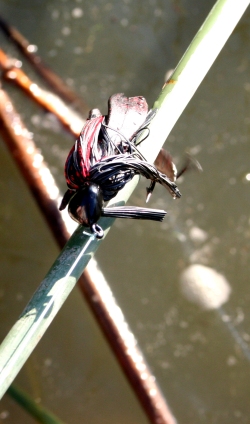|
For me, the word sharp is defined by Owner hooks with Gamakatsu a close second. My unscientific method for making this determination is to press lightly on the hook point and see what kind of a chill runs up my spine. When I check the hook point on an Owner hook, it sends a heck of a chill up my spine. There are other, lesser-known, hook brands that are excellent, but as far as readily-accessible, out-of-the-box sharpness, Owner and Gamakatsu are where it's at. Take a hook from either brand, rig your bait, and you've put your odds of losing a fish due to a dull hook as low as they can go. The trickier part is making sure that hook stays sharp throughout the day and proactively replacing or sharpening it - before it costs you an important bite. So let's delve into the details and discuss some practical strategies for hook maintenance. hook, it sends a heck of a chill up my spine. There are other, lesser-known, hook brands that are excellent, but as far as readily-accessible, out-of-the-box sharpness, Owner and Gamakatsu are where it's at. Take a hook from either brand, rig your bait, and you've put your odds of losing a fish due to a dull hook as low as they can go. The trickier part is making sure that hook stays sharp throughout the day and proactively replacing or sharpening it - before it costs you an important bite. So let's delve into the details and discuss some practical strategies for hook maintenance.
The first step in hook perfection is to become aware of the situations that cause hooks to become dull. We all know that dragging a hook through the rocks will make it dull, but there are less obvious pitfalls that are very easy to overlook. One example is the damage that tulles (check dictionary.com for the correct spelling) can cause. Several years ago I was fishing a Texas rig with the hook fairly exposed and was surprised how dull my 5/0 Gamakatsu Superline EWG's were getting as a result of being snagged on tulles when pulled out. Ripping the hook through several feet of dead tule stalk can be especially damaging (see photo). Hooks may also get dull as a result of rubbing against the body of a hardbait, a bass' jaw bone, a stick, stiff grass like hydrilla, the bottom of your shoe sole - the list goes on. The important thing, though, is to build awareness of situations where your hook may become damaged so that when one of these situations happens, you instinctively check the hook rather than continue to fish.
|
